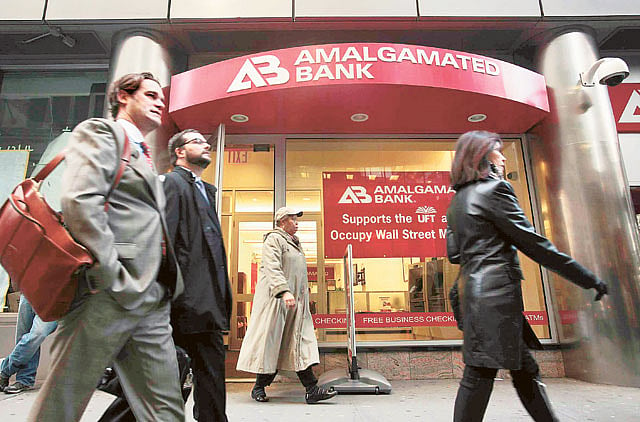A bank that rolls out red carpet to Occupy protesters
Union-owned Amalgamated is the financial institution of activists

New York: The Occupy Wall Street movement has led many banks to hire extra security. But Manhattan's Amalgamated Bank has rolled out the red carpet.
The bank, owned by the Workers United labour union, has emerged as the unofficial financial institution of the anti-Wall Street movement.
Even people who hate banks, it seems, need a bank.
"It was quite obvious we were not going to open a Bank of America account," said Wylie Stecklow, who serves on Occupy Wall Street's finance committee. "But we had to deal with banks if we were going to process funds."
Amalgamated is where the Occupy Wall Street movement has about $326,000 (Dh1.19 million) in donations deposited, or about two thirds of the total raised by the New York arm of the movement, according to its finance committee.
When things have heated up, as they did when protesters were temporarily evicted last week, the bank has provided support, including storage space and conference rooms, and has kept tellers around after hours when protesters needed money.
Less attractive corners
But even banks trying to change the world get drawn into the less attractive corners of Wall Street. Amalgamated made some controversial investments in California subprime mortgages and recently gave a 40 per cent ownership stake to some of the same private equity titans that Occupy Wall Street has been protesting against.
"First and foremost the bank has to be a bank, and has to be and should be a successful bank," said the bank's chairman, Noel Beasley, who is also the head of the Workers United union. Ed Grebow, the bank's CEO, is a former private equity manager himself, coming to the bank from J.C. Flowers & Co, a global private equity firm run by billionaire investment banker Chris Flowers.
More recently, though, Grebow has been out on the streets of New York protesting during marches aimed at denouncing the banking industry. "I'm trying to show personally that you can be a bank, but also be supportive of progressive values," said Grebow, who occupies a corner office in midtown Manhattan that is sparsely decorated with old union trinkets.
The tension between upholding progressive ideals and operating in a world mesmerised by money has been a growing issue for Occupy Wall Street. It has come up in the movement's incongruous effort to trademark its name, and in debates about accepting donations from business leaders.
In California, the Oakland encampment confronted the contradictions when it begrudgingly deposited $20,000 in a mega bank — Wells Fargo — while it waited for a credit union account to open. But these tensions are brought into particular focus at Amalgamated.
Founded by the Amalgamated Clothing Workers of America in 1923, the bank has a long history of trying to bridge the chasm between capitalism and labour.
In the early days, the bank existed to provide services to immigrant workers whom other banks avoided. Amalgamated has continued to cater to those customers, with things such as free chequing accounts and branches in working-class neighbourhoods that are underserved by other banks.
Careful effort
The bank has grown to 27 retail branches focused mostly in New York, with other locations in Pasadena, Las Vegas and Washington. But along the way, the bank has also added some of the more complex financial products that have gotten other banks into trouble — including a commercial loan division and a relatively new unit focused on making private equity investments. Grebow says with each of the bank's operations there is a careful effort to only support projects that its union partners would agree with.
"We talk a lot about what we need to do to be a bank that has good business practices," he said.
— Los Angeles Times
Sign up for the Daily Briefing
Get the latest news and updates straight to your inbox
Network Links
GN StoreDownload our app
© Al Nisr Publishing LLC 2026. All rights reserved.